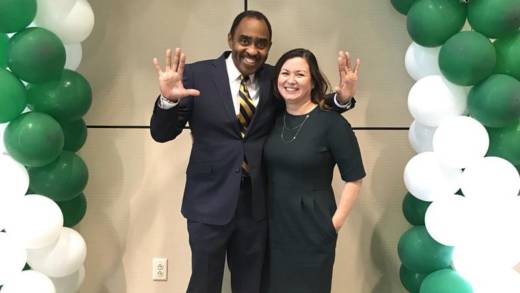Emmett Carson, the CEO of the Silicon Valley Community Foundation, is officially out, the Foundation announced Wednesday.
“Today, Dr. Carson will end his employment with SVCF after more than a decade of service, effective immediately,” the board of directors published on the Foundation’s website. “This will enable SVCF to continue to rebuild its workplace environment and execute its mission as effectively as possible.”
Carson had been on paid administrative leave for approximately two months during an investigation of alleged managerial misconduct at the nation’s biggest community foundation. Board member Greg Avis will continue to serve as interim CEO while a national firm searches for a permanent replacement.
The board also released a summary of the report detailing an independent investigation by the law firm Boies Schiller Flexner.
The board of the Silicon Valley Community Foundation commissioned the investigation in April, following reports of harassment and bullying at the hands of the nonprofit’s top fundraiser, Mari Ellen Loijens. A summary of the full report substantiates many of the allegations from current and former employees in blunt terms:
BSF’s investigation found that there were certain widespread workplace culture issues at SVCF, including a fear of speaking out or reporting workplace issues out of concern for retaliation, as well as a distrust of HR leadership. The top-down, “command-and-control” management style of SVCF’s formerCEO and former senior development executive contributed to this environment.
There were other workplace culture issues at SVCF that were not as widespread, but that were serious and affected many employees. These included sexual, racial, crude, and otherwise inappropriate remarks and conduct that became “normalized” within certain divisions, as well as public shaming and bullying behavior exhibited at times by certain former SVCF executives. Unacceptable behavior by certain former SVCF executives was often inadequately addressed or overlooked. Many employees (including other SVCF executives) reported feeling that certain former SVCF executives were“untouchable” regardless of their actions. When complaints were raised to HR or SVCF leaders, the systems put in place frequently failed to sufficiently address inappropriate conduct and ensure that appropriate remedial action was taken. Instead, employees were left with the impression that if they did not like the workplace culture, they were free to“get off the bus.” This evidently led some current and former employees to feel that they had no other option but to address workplace concerns in the press or write a letter directly to the Board.
The Board acknowledged that, “This failure happened under our watch.” Also, “We are deeply sorry to our entire community, especially our past and present employees.”



